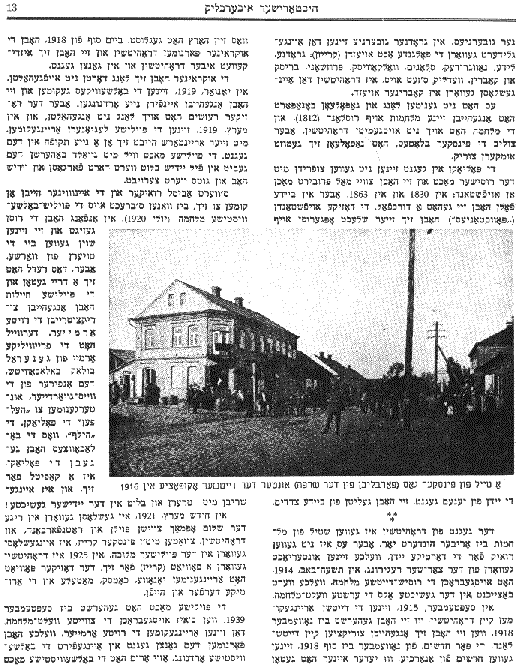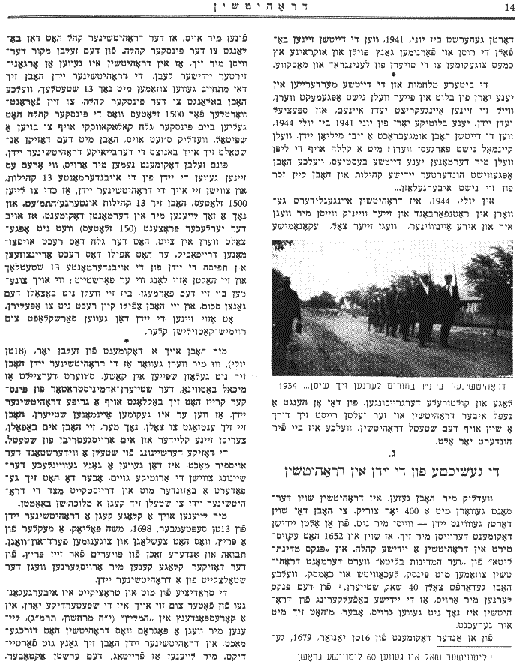Previous Page
|
Next Page

[
Page 13
]
The gubernia of Grodno included the following regions: Grodno, Lida, Novgrudek,
Slonim, Volkovisk, Pruzhany, Brisk and Kobrin. Apparently, Drohitchin was then
part of the uyezd [district] of Kobrin.
Before long, Napoleon Bonoparte began his wars against Russia (1812), and the
war did not spare Drohitchin. However, because of the Pinsk marshlands,
Napoleon was forced to turn back.
The Poles of the area were unhappy with the Russian government and attempted
two uprisings against it: in 1830 and in 1863. Both times, however, the Poles
were defeated. These rebellions were very bad for the Jews of that area, who
suffered at the hands of both sides.
[Photo caption:] A part of Pinsker Street (spared by the fire) under German
occupation in 1916.
**
*
The area surrounding Drohitchin was untouched by wars for over a hundred years,
however, the situation did not remain calm for the local Jews, who remained
subjugated by the Czarist government. In 1914, on the ninth of Av, the Jewish
day of mourning for the Temple of Jerusalem, the Russian-German war broke out;
it was the history books call World War I.
The Germans entered Drohitchin in September, 1915, and remained there until
November, 1918, when they withdrew back to Germany. The two months from
November until the end of 1918, were months of anarchy, when every person did
whatever his heart desired. At the end of 1918, the Ukrainians occupied
Drohitchin, and lorded over it and the whole surrounding area.
The Ukrainians didn't last very long. In January, 1919, the Bolsheviks arrived
and instituted new rules and regulations. That regime, however, didn't last
very long either. In March of 1919, the Polish Legionnaires entered Drohitchin.
Their arrival brought about a new era for the whole region. The Polish wanted
to take the area by force; Jewish blood was spilled there, and a lot of Jewish
property and possessions were plundered.
Things were just beginning to settle down, and the inhabitants of the area were
just starting to get their lives back to normal, when the Polish-Bolshevik War
broke out in July, 1920. At first the Russians were winning and were already at
the gates of Warsaw, but their luck ran out, and the Polish army started to
drive them back. In the meantime, the volunteer army of General Bulak
Balakhovitch, the leader of the White Guards, decided to "help" the
Poles. The "help" they offered the Poles is a story in itself, a
story written in Jewish history with tears and blood!
The peace treaty between Poland and The Soviet Union was signed in Riga in
March, 1921, and resulted in Drohitchin and the Pinsk region being annexed to
Poland. In 1925 Drohitchin became a separate district, which included Yanove,
Khomsk, Motela, and the surrounding villages and hamlets.
The Polish government controlled the area until September, 1939 when World War
II broke out. The Red Army arrived, and took the whole area and instituted
Bolshevik system. The Bolsheviks controlled the area until June of 1941
 [
Page 14
]
[
Page 14
]
when the Germans attacked them, took over all of Poland and Ukraine, and almost
got to the gates of Leningrad and Moscow.
*
The bitter wars and the German atrocities during those years of blood and fire
will never be erased; they are etched in the minds of everyone, especially in
the minds of the Jewish People. Those bloody years, from June, 1941 to July,
1944, when the Germans annihilated seven million Jews, will never be forgotten!
We will only mention those German beasts with a curse on our lips because of
the fact that they wiped out hundreds of Jewish communities without even
leaving a trace.
[Photo caption:] Drohitchin young men, members of the Betar Organization,
learning how to shoot.
In July, 1944, Drohitchin became part of the Soviet Union. Very little is known
about the town and its inhabitants: how many there were, their economic
condition or their cultural achievements. From then on, a veil has hung over
Drohitchin, and only rarely does a ray of sunshine break through to the town,
which is now four hundred years old.
C.
THE HISTORY OF THE JEWS OF DROHITCHIN
As we have already observed, Drohitchin was already mentioned four hundred
years ago. Whether Jews were living there at that time is unknown. An old
Jewish document tells us that there existed, as early as 1652, a Jewish
community in Drohitchin. In the registry book,
The State of Lithuania
of the
Councils of the States of Lithuania,
Drohitchin is mentioned together with Pinsk, Lekhovitz and Khomsk as having to
pay 40 shok in taxes. From the registry book, we learn that the Jewish
population of Drohitchin was small, but was large enough not to be ignored.
Another document, dated January, 1679, indicates that the Jewish community of
Drohitchin was then part of the Jewish community of Pinsk, and from the same
source we learn that there was organized Jewish life in Drohitchin. The Jews of
Drohitchin, together with the Jews of 13 other towns that were also part of the
greater Pinsk community, promised to be responsible for repayment of 1500
zlotys [Polish currency] borrowed from Kalakovski, the priest of Pinsk to build
a hospital. Evidently, the hospital was also used by the Jews of Drohitchin.
This event also indicates the level of poverty of the Jews of Drohitchin and
the other aforementioned 13 Jewish communities, since thirteen communities had
to co-sign a loan of 1,500 zIoty. The document also indicates that if the
annual interest charge of 150 zloty was not paid on time, the priest had the
right to demand a three-fold increase. He even had the power to jail the Jews
of the aforementioned towns, and to keep them there as long as he wanted. He
could also confiscate their property until the entire sum was repaid. The Jews
didn't even have the right to appeal.
This is how the Jews of that time were virtually enslaved to the Roman-Catholic
clergy.
*
There is another document from July 18th
of same year, indicating that the Jews of Drohitchin did not let themselves be
exploited. The document states that the tax collector in the District of Pinsk,
Michael Botvina, complained that when he came to collect the taxes from a group
of Drohitchin Jews, they refused to pay. In addition, they attacked him, tore
his clothes and drove him out of town.
This example of protesting against the ruling government was a common
occurrence among the neighboring gentiles, but it demanded extraordinary
courage and bravery for the Drohitchin Jews to stand up to a government
official.
We also read of a complaint dated September 13, 1698 that was lodged against a
Drohitchin Jew named Moshe Polyak, a broker who worked for a nobleman, and who
beat some peasants and stole a horse and wagon, some grain and other items for
his nobleman. This complaint tells us something about the pride of a Drohitchin
Jew.
The tradition of courage and defiance was also transmitted from father to son
in later years as well. In correspondence to the journal,
Hamelitz,
(18 Cheshvan, 5643 [October 31, 1882]), we read a letter about a pogrom that
occurred in Drohitchin, and in which the local Jews defended themselves quite
well. The letter states that, on Friday, October 1, 1883, [there is obviously
an error in one of these two dates]
Previous Page
|
Next Page
This material is made available by JewishGen, Inc.
and the Yizkor Book Project for the purpose of
fulfilling our
mission of disseminating information about the Holocaust and
destroyed Jewish communities.
This material may not be copied,
sold or bartered without JewishGen, Inc.'s permission. Rights may be
reserved by the copyright holder.
JewishGen, Inc. makes no representations regarding the accuracy of
the translation. The reader may wish to refer to the original material
for verification.
JewishGen is not responsible for inaccuracies or omissions in the original work and cannot rewrite or edit the text to correct inaccuracies and/or omissions.
Our mission is to produce a translation of the original work and we cannot verify the accuracy of statements or alter facts cited.
 Drogichin, Belarus
Drogichin, Belarus
 Yizkor Book Project
Yizkor Book Project
 JewishGen Home Page
JewishGen Home Page
Yizkor Book Director, Lance Ackerfeld
This web page created by Lance Ackerfeld
Copyright © 1999-2026 by JewishGen, Inc.
Updated 3 Dec 2001 by LA

 [
Page 14
]
[
Page 14
]
 Drogichin, Belarus
Drogichin, Belarus
 Yizkor Book Project
Yizkor Book Project
 JewishGen Home Page
JewishGen Home Page